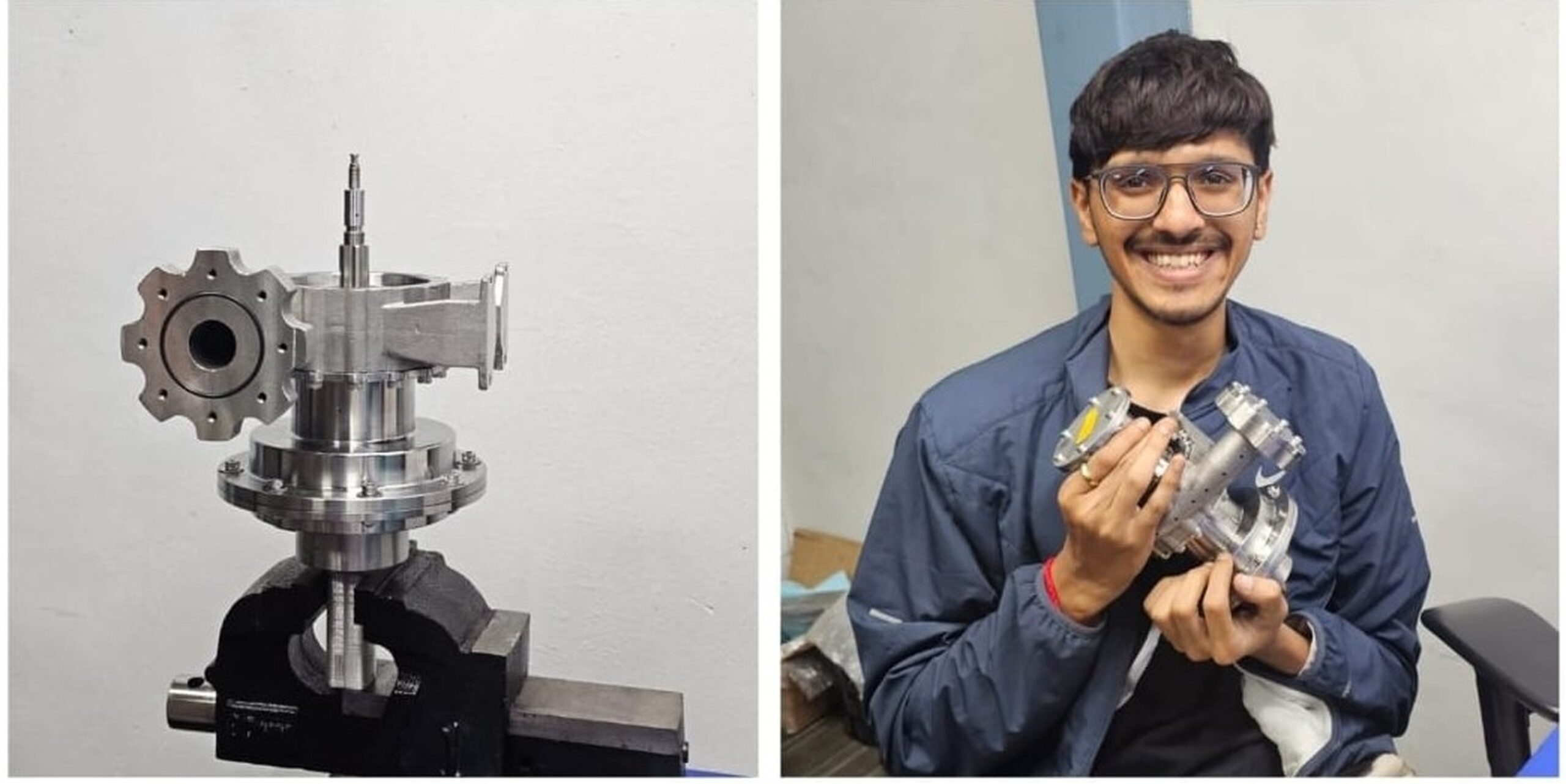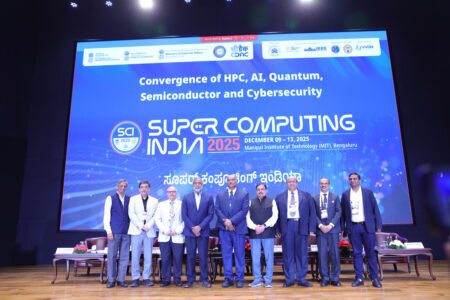- Astrophel Aerospace has successfully developed an indigenous cryo-pump capable of spinning at 25,000 RPM, to power its next-gen rocket engines.
- It awaits testing and certification by ISRO, marking a significant technical milestone in propulsion technology.
- The next stage of development will focus on upgrading it to a turbopump for integration into its in-house first and second stage engines by late 2026.
- Referred to as the “heart of a rocket engine”, it requires more than 50 precision-engineered components.

Suyash Bafna, Cofounder, Astrophel Aerospace, holding the cryo-pump for testing
Astrophel Aerospace, a Pune-based space tech startup, is currently testing and characterising its indigenously developed cryogenic pump at ISRO facilities. Once successfully validated, the cryo-pump will be upgraded into a fully-fledged turbopump for integration into the startup’s rocket engine, the Astra C1, by late 2026. The technical milestone positions Astrophel as one of the first private Indian space startups to develop an in-house cryo-pump.
Astrophel is also in the process of signing an MoU with a US-based partner and is actively exploring additional global collaborations for export commercialisation at the sub-component level to service rising demand in the global space sector and industries such as oil and gas, which handle cryogenic liquids. Unlike other technical approaches, a turbopump draws power directly from the engine itself, eliminating the need for external batteries, making it a more sustainable long-term solution for space engine reusability and cost-efficient launches across all segments.
“This milestone is a testament to how India can indigenously develop advanced propulsion technologies at a fraction of global costs,” said Suyash Bafna, Co-Founder of Astrophel Aerospace. “ISRO’s certification will validate not just our pump, but India’s ability to innovate world-class space hardware with global export opportunities”, he added.
What began as fifty-plus separate, precisely engineered components comes together into a cryo-pump system that spins at 25,000 RPM, delivering cryogenic fuel that will power both Astrophel’s first and second-stage rocket engines. For context, at least 8-9 turbopumps are required just during the first-stage liftoff of an SSLV.
The announcement comes as India sets its sights on growing its space economy from $8.4 billion in 2022 to $44 billion by 2033, capturing 8% of the global market. With more than 250 startups entering the sector, propulsion milestones like Astrophel’s cryo-pump are vital to achieving this vision. “This milestone represents the culmination of years of frugal engineering and is a stepping stone toward India’s first privately developed gas generator cycle,” added Immanuel Louis, Co-Founder, Astrophel Aerospace.
Though the size of a one-litre bottle, the cryo-pump is powerful enough to generate 100 to 150 horsepower, equivalent to that of a family car, which will be scaled up to deliver 500 to 600 horsepower (turbopump) for larger launch vehicles. Acting as the “heart of the rocket,” a turbopump feeds cryogenic fuel into the engine at high pressure, ensuring efficient thrust control and lower material costs. Astrophel’s approach differs from other startups pursuing 3D-printed, electric pumps. Adopting lean manufacturing principles from the auto sector ensures cost efficiency, rapid assembly, and scalable production.
Astrophel Aerospace is an Indian space tech startup developing affordable, dedicated launch vehicles for small satellites, powered by semi-cryogenic propulsion systems. Its flagship Astra C1 series and Potentia engine position it among the few Indian private companies to have independently built and successfully test-fired a semi-cryogenic engine on 15th August 2023, without any external funding. By combining best practices from automotive manufacturing with 3D printing, Astrophel reduces production time and cost by up to 40%, making it potentially one of the most accessible launch providers in the segment. The company has developed in-house capabilities across throttleable engine valves, regenerative nozzle design, cryogenic subsystems, and real-time avionics software. Astrophel is planning full orbital missions from Indian launchpads utilising reusable launchers to capitalise on the potential of India’s space industry, projected to reach USD 44 billion by 2033. It is supported by a distinguished advisory board of propulsion experts with experience working at ISRO, Hindustan Aeronautics Limited and DRDO. Together, they bring technical oversight and strategic depth to Astrophel’s mission to democratise space access.
Suyash Bafna is the Co-Founder of Astrophel Aerospace, playing a key role in systems integration, operations, and strategic execution. With a background in mechanical engineering, Suyash bridges the gap between propulsion, avionics, and structural design, ensuring that Astrophel’s launch systems are optimised for performance and reliability. He has been instrumental in coordinating subsystem development for the Astra C1 vehicle and managing timelines for the company’s upcoming suborbital launch. His focus on mission-readiness, testing protocols, and cross-functional collaboration has helped streamline development despite limited resources. At Astrophel, Suyash also oversees external partnerships and vendor alignments, working to reduce costs while maintaining technical integrity. Passionate about building indigenous space capabilities, he is committed to enabling affordable access to space for small satellite operators. His systems-driven leadership contributes significantly to Astrophel’s goal of becoming India’s most cost-effective and agile launch provider.
About Immanuel Louis
Immanuel Louis is the Co-Founder of Astrophel Aerospace. An aerospace engineer by training and a lifelong aviation enthusiast, Immanuel holds a master’s degree from MIT Chennai. His journey began with building remote-control aircraft as a child and evolved into co-building one of India’s most affordable semi-cryogenic rocket engines. At Astrophel, he spearheads propulsion system design, engineering integration, and business strategy. He is committed to building India’s next-gen launch infrastructure and fostering a new wave of aerospace talent. His passion lies in combining indigenous innovation with global best practices to position Astrophel as an upcoming leader in the small satellite launch segment.
About MD Taj Baba, Founding Member & Head of Aero Thermal Engineering
MD Taj Baba is a founding member of Astrophel Aerospace and currently leads aero-thermal engineering initiatives with a dedicated focus on liquid propulsion and rocket nozzle systems. With a Bachelor’s in Aeronautical Engineering from AeSI, New Delhi, and a Master’s in Thermal Engineering from Osmania University, Taj brings crucial expertise in thermodynamic analysis, engine heat transfer, and high-performance thermal system design. While instrumental in shaping Astrophel’s early vision and direction as a Co-Founder, Taj is now transitioning away from operational leadership to focus full-time on technical development within the propulsion team. At Astrophel, he has played a pivotal role in the design and validation of critical cryogenic engine components, control valves, and regenerative cooling systems. An Associate Member of the Aeronautical Society of India and a mentor to aspiring aerospace engineers, Taj remains deeply committed to advancing indigenous semi-cryogenic propulsion technologies and scaling India’s capabilities in the global space sector.




